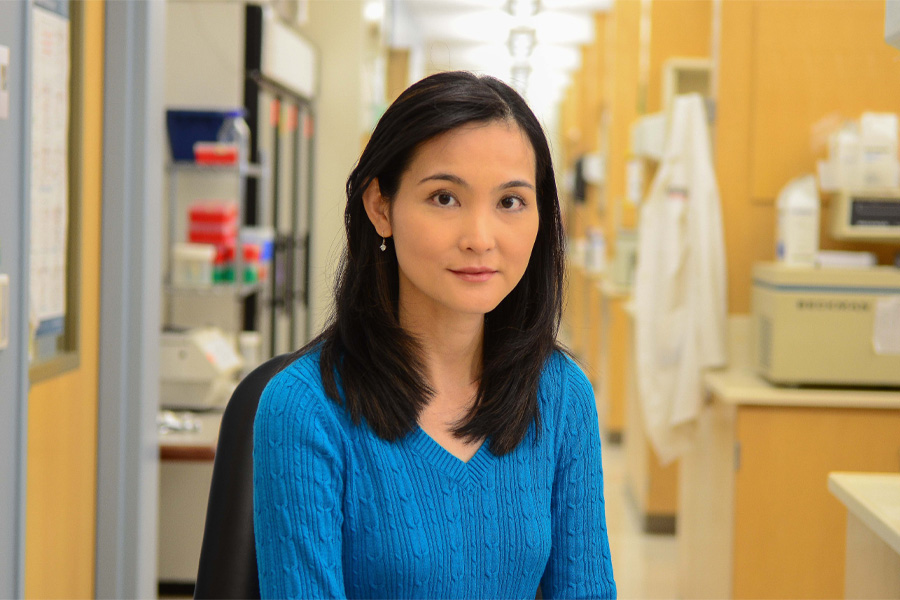Melissa Teoh, PhD
Associate Professor, UNMC Department of Biochemistry and Molecular Biology
Research focus: Redox signaling between cancer cells

Research
Redox signaling regulating interactions between cancer cells and their associated macrophages and fibroblasts
Our long term goal is to unravel molecular pathways that contribute to an oxidative tumor microenvironment (TME) that drives the reciprocal interactions between the cancer cells and their stroma components.
Role of extracellular oxidative stress in breast cancer
Oxidative stress is induced when there is an imbalance in the production of reactive oxygen species (ROS, e.g. O2•- and H2O2) and their removal by the antioxidant network. Cancer cells are known to possess a higher oxidative status compared to their normal counterparts. We have previously found that loss of an extracellular antioxidant enzyme, named extracellular superoxide dismutase (EcSOD), is one of the key factors that contributes to a higher accumulation of reactive oxygen species (ROS) in breast cancer cells. While EcSOD is highly expressed in normal mammary epithelial cells, we observed that its gene expression is silenced in > 80 % of breast tumors and its expression level shows an inverse correlation with aggressive phenotypes (Oncogene 2014, featured article). Our NIH NCI-funded research focuses on determining the involvement of epigenetic silencing of EcSOD during tumorigenesis and to elucidate the role of this enzyme in the progression and metastasis of breast cancer. We are currently investigating how loss of EcSOD in cancer cells promotes an oxidative-mediated activation of key oncogenic receptor tyrosine kinase (RTK) pathways.
Role of ROS in promoting tumor-supporting phenotype in CAFs
Our recent studies showed that cancer associated-fibroblasts (CAFs) is a major contributor to the oxidative TME, via up-regulation of NADPH Oxidase 4 (Nox4). We now realize that the progression from normal to benign, benign to malignant, malignant to metastatic, as well as therapeutic resistance is driven not just by what is happening inside the tumor cell itself but by reciprocal communication between the tumor cells and their stroma microenvironment. CAFs are the most prominent stromal components that independently influence the survival of breast cancer patients. However, we still do not fully understand how these CAFs acquired their tumor-supporting function. A better understanding of factor(s) influencing their pro-tumorigenic function could lead to identification of CAF-focused therapeutic targets. Targeting CAFs not only will attenuate this tumor supporting system, but it has been shown to also improve current anti-cancer therapies. A challenge in developing CAF-based therapies is the heterogeneous nature of these CAFs with vastly diverse characteristics. Our study suggests that a potentially targetable molecule in the majority of breast CAFs is Nox4. We are currently focusing on understanding how Nox4 induces an autophagy-mediated pro-survival stress response in breast CAFs that supports their tumor-promoting phenotype.
Reprograming TAMs via antioxidant approaches
Although mounting evidence has suggested a causal relationship of oxidative stress in promoting breast tumorigenesis, the role of reactive oxygen species (ROS) in tumor immunosuppression is not known. Our preliminary data suggest that antioxidants can reprogram tumor-associated macrophages (TAMs) into anti-cancer macrophage phenotype, implying that an oxidative TME contributes to the immunosuppressive tumor phenotype. We are currently investigating whether simultaneously targeting pro-tumorigenic macrophages with antioxidants to increase the efficacy of T cell blocker inhibitors will be a more effective strategy to combat the tumor-mediated immunosuppressive responses.
Targeting Redox vulnerabilities in the TME
We now realize that the progression from normal to benign, benign to malignant, malignant to metastatic, as well as therapeutic resistance is driven not just by what is happening inside the tumor cell itself but by reciprocal communication between the tumor cells and their stroma microenvironment. Therefore, targeting the cellular and molecular components involved in events occurring in the tumor microenvironment could be a more effective strategy for cancer treatment. By focusing on not only the cancer cells, but also their stroma fibroblasts and macrophages, our multipronged approaches will help to identify potential TME-attenuating approaches targeted at their redox vulnerability.
Research Opportunities
- Graduate students considered on an individual basis
- Medical students, summer research
University of Nebraska Medical Center
985870 Nebraska Medical Center
Omaha, NE 68198-5870
Lab Contact: 402-559-7073